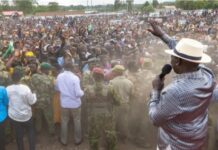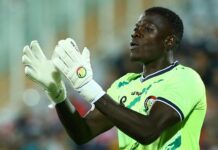Kenya’s President Uhuru Kenyatta has been re-elected following Tuesday’s vote, election officials say.
Mr Kenyatta, in office since 2013, took 54.3% of votes, ahead of his rival Raila Odinga, with 44.7%.
After the announcement, Mr Kenyatta called for unity, telling opposition supporters: “I reach out to you… We are all citizens of the same republic”.
But the opposition rejected the results even before they were declared, calling the process a “charade”.
However it has been endorsed by international observers. Mr Kenyatta said they had ensured a “free, fair and credible election”.
Earlier, Mr Odinga’s supporters said he had won, and published their own figures. The electoral commission said this was “illegal and premature”, and said basic mathematical errors had been made.
Many observers fear a repeat of the violence after the disputed election 10 years ago when more than 1,100 Kenyans died and 600,000 were displaced.
Raila Odinga has come up short again in what was his fourth and probably last attempt to become the president of Kenya.
Polls had shown that he was tied with President Kenyatta in a race tipped to go either way. Well, they were wrong. Mr Odinga’s backing by an opposition alliance was not enough to stop Mr Kenyatta’s re-election.
The opposition leader had campaigned as a change candidate, calling himself the biblical Joshua and promising to lead Kenyans to Canaan, the promised land.
Despite the fact that he rallied and excited thousands across the country, a majority of voters have rejected his message, or rather rejected him, and embraced Mr Kenyatta’s vision of transforming the country.
This election was also about the political duel between the Kenyatta and Odinga families, which dates back to Kenyan independence. Once again the Kenyatta camp has won.
One of the leaders of the opposition Nasa alliance, Musalia Mudavadi, said before the results announcement that its concerns about the poll had not been adequately addressed.
Nasa had complained of fraud and hacking.
Another top opposition official, James Orengo, said the coalition would not be taking its issues to court, raising the spectre of street protests.
He hit out at international observers, including former South African President Thabo Mbeki and former US Secretary of State John Kerry, casting doubt on their credentials.
“Nobody should think this is the end of the matter,” he said.





![$150m needed to win presidential election in Ghana – CDD report 2024 polls: Voting underway across Ghana [Photos]](https://www.adomonline.com/wp-content/uploads/2024/12/WhatsApp-Image-2024-12-07-at-07.23.25_68175f6b-218x150.jpg)
